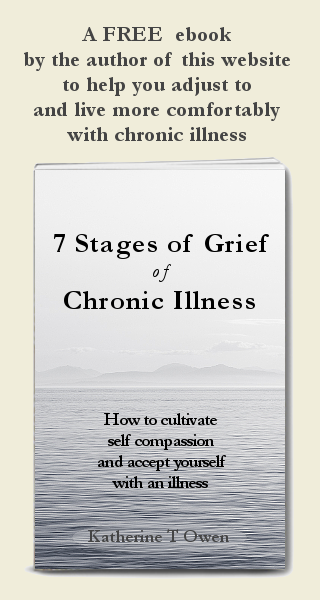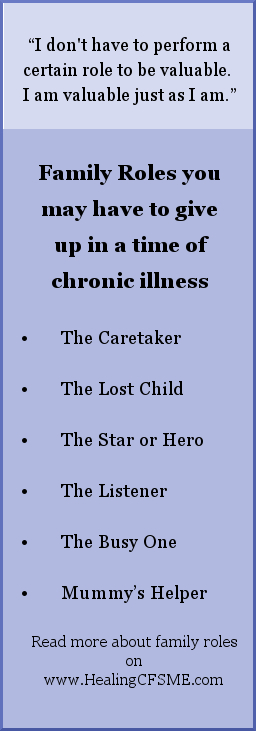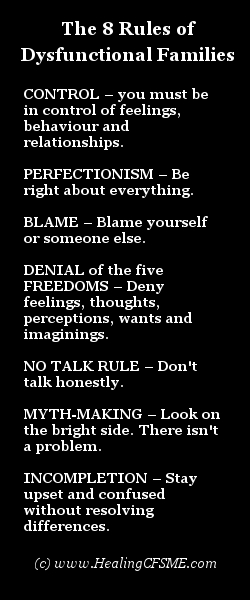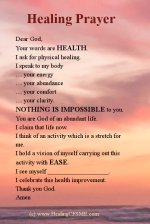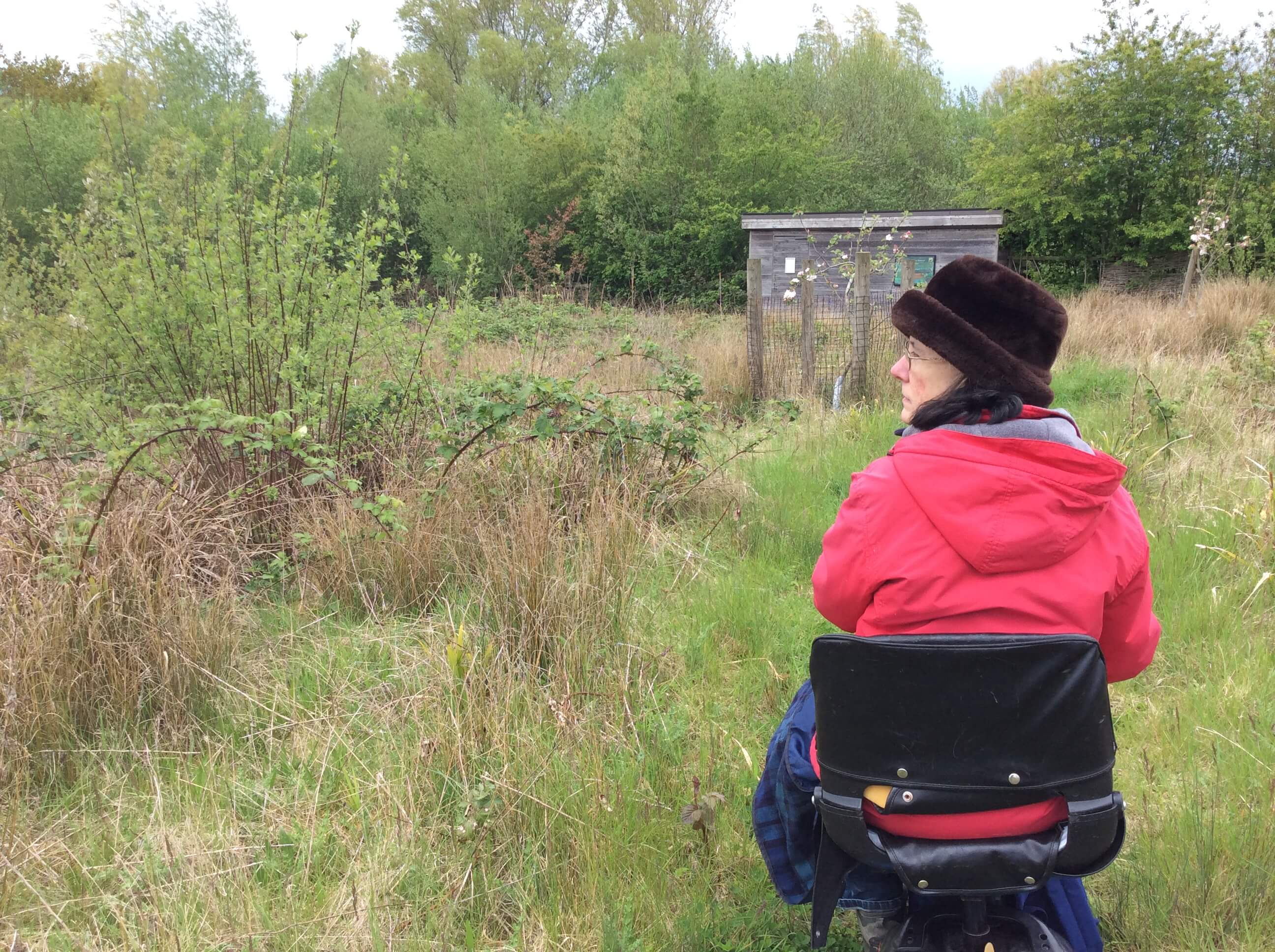Family Roles
Letting them go and healing the past
In every family each child is likely to assume certain family roles (or a single role) in an attempt to gain a parent's love.
Siblings may take up different roles in order to compete for a parent's love.
If your family was dysfunctional - many are! - the family role you played may have become rigid. Your self esteem or sense of security may have become tied up with your ability to behave in the way expected of you.
In a time of chronic illness, you may find that physical health challenges mean you are unable to play your family role. You may feel a loss of sense of self. You may feel inappropriate guilt and shame. You may experience a drop in self worth.
Or click here to CHOOSE FROM
A RANGE OF personalizable cards and gifts.
The healing-themed gifts are designed by myself, Katherine, the author of
this website HealingCFSME.com
Proceeds go towards the cost of the website. Thank you. Enjoy!
Living with chronic illness is hard enough . As part of a commitment to emotional healing and healing the past, it is well worth considering if you are locked into a family role. You can give yourself permission to behave in a new way - a way that allows you to ask for the help you need and to find a bigger life, regardless of your level of health.
Family roles are an idea introduced in Family Systems Therapy. In this article, the roles are applied to living with chronic illness.
(Scroll to the bottom of the page for links to more advice on www.HealingCFSME.com about improving relationships when living with chronic illness.)
A List of Family Roles You May Have To Give Up In A Time of Illness
Here are some of the roles within the family that you may be forced to give up in a time of chronic illness. Below I include some release statements (It's OK to...) and positive self talk for each one, so you can give yourself permission to explore new behaviours.
- The Caretaker
- The Lost Child
- The Star or Hero
- The Listener
- The Busy One
- Mummy’s Helper
The family systems role of... The Caretaker
A caretaker is a child who takes on the psychological role of looking after one or more other members of the family either emotionally or physically.
You are unlikely to have the physical health to continue in the role of caretaker in a time of illness. This may be painful for you. You need to work on knowing you are of great value even in a time when you are not able to physically help others. If you are open to the idea of spiritual healing, it is a great time to be willing to allow God to love you.
Release Statements:
It's OK to look after others.
It's OK not to look after others.
It's OK to look after yourself.
It's OK not to look after yourself.
The family systems role of... The Lost Child
You are a lost child if you learned to hide your needs away to a significant degree.
As a lost child you may find it painful to be suffering
from a chronic illness where your symptoms are apparent to many. You
may pretend to be healthier than you are, feel shame and guilt around being ill, and struggle to ask for the help you need.
History may also repeat itself: you may get an illness whose seriousness is not easily visible. Chronic Fatigue Syndrome (CFS/ME) is a great example of an illness likely to be manifested by a Lost Child.
To move forward you need to allow yourself to have these needs, even in a world that does not seem to give much sympathy or assistance.
Positive self talk:
It's OK to have needs.
It's OK to let someone see my needs.
It's OK for someone else to meet my needs.
My needs are important.
I am willing to meet my needs.
I find it easy to take my needs into account.
The family systems role of... The Star or Hero
As a star of hero you may have taken on the role within the family of being good at everything... or perhaps one particular thing.
In a time of illness you may not be seen to excel at something. In
fact, there are probably many things you are doing wonderfully. The fact
you are surviving and keeping sane may be a huge achievement in the
circumstances under which you are living, but survival is unlikely to gain you much recognition.
A time of illness is an opportunity to learn to define yourself by something other than your achievements.
It's OK to do well at something.
It's OK not to do well at something.
I am of inherent value.
I don't need to constantly achieve in order to be of value.
Whatever I can do and can't do right now, I am as God created me.
There is a Beauty and Love in me that I can never lose.
The family systems role of... The Listener
Was it your role to be the one who listened to one or many other members of the family? Was there an imbalance - a lack of listening to you by the same members of your family?
Living with ME/CFS or one of many other chronic illnesses, your ability to tolerate noise and to listen may be much reduced. If you played the family role of Listener, it may be uncomfortable for you not to be able to listen to others in the way you once did.
You may also need to talk to someone about how you feel about having an illness and its impact on your life.
It may feel uncomfortable for you to be the one talking about your problem, because you feel you should be listening.
On the other hand, you may find that if your speech is reduced, you end up listening quite a lot.
Well done for the value you provide by listening.
Well done for saying when you are too tired to listen.
Release Statements: (Click for a free book on using the Release Statement.)
It's OK to listen.
It's OK not to listen.
It's OK for someone to listen to me.
It's OK for me to be heard.
Even when I don't listen to someone, I am still of value.
I allow myself to talk about living with illness.
I receive comfort from someone listening to me.
I allow myself to talk about something that delights me.
I enjoy sharing my opinions and insights.
The family systems role of... The Busy One
Did you gain a sense of value from always keeping busy?
Our society often views being busy as synonymous with being of value.
Being busy can distract you from feelings of not being of value. These
feelings may come to the surface when you are forced through illness to
sit still or lie still. For yourself and for others, you can do the
important work of
allowing God to love us
as you are. (You may not use the word God by the way. But research shows
that making a spiritual connection is one of the 6 key factors in
spontaneous recovery from cancer)
It is important to learn to rest in order to find a big life when living withCFS/ME or many other chronic illnesses. Learning to rest becomes easier as you let go of the need to be the busy one.
Release statements and healing affirmations:
It's OK to be busy.
It's OK not to be busy.
Whatever I can do and can't do, I am of value.
I am as God created me.
The family systems role of... Mummy’s Helper
If you were designated the family role of Mummy’s helper (or Daddy's
helper), and this role was inappropriately rigid, then even if you get
ill as an adult, your family system may be annoyed that you cannot
fulfil that role.
When I speak of the family system, this may be your mother, but also your siblings, your father and yourself.
In a flexible system, someone will step in to take on the role of helping your parent. Or perhaps your parent doesn't actually even need help and would be better off looking after themselves.
In a dysfunctional family system, you may experience pressure to continue taking on the family role of helper even when it is not healthy for you to do so.
If you take on the family role of helper to your parents you may be seeking to avoid the existential pain of finding that your parents do not know how to look after you in some way. You may be defining yourself inappropriately by the way your parents treat you: “If my parents don't look after me then clearly I am not worth looking after.”
To solve the existential pain of knowing that your parents don't know how to look after you well, you can take on the family role of looking after them instead.
Release Statements and Affirmations:
It's OK to look after your parent.
It's OK not to look after your parent.
It's OK to be looked after by your parent.
It's OK not to be looked after by your parent.
Even when I am not looking after someone, I feel of value.
Even when I am not looking after someone, I feel good about myself.
I feel comfortable putting my needs ahead of someone else's.
I enjoy looking after myself.
Their behaviour and abilities do not define me.
It is nothing to be ashamed of.
It is the way my world was at a particular time.
It may be the way the world is for me now.
But it is not the way the world has to be.
I am calling in a new world – one in which I can be looked after.
I allow myself to be looked after by myself and others.
Please know that if your self worth has been tied up with playing a certain family role then you are unlikely to change easily. If you find yourself compelled to behave in a certain way, be very gentle with yourself. Already, the awareness of your compulsion, shows that you have more freedom than you had before.
Wishing you God's speed on your journey of emotional healing,
Katherine
Katherine T Owen
Webmaster and author of Be Loved, Beloved (lulu.com or kindle)
Links Related to Family Roles in a time of CFS / ME (or other chronic illnesses)
- Read about new skills and permissions you need to live well with chronic illness.
- Read my poem on the healing power of friendship when I was living with very severe Chronic Fatigue Syndrome.
- Learn to be gentle on yourself if you encounter disbelief or a lack of understanding.
- An article on navigating the challenges of chronic illness and a romantic relationship.
- Katina Makris talks about how her relationship was affected in her book on living with Lyme Disease. (She had earlier been diagnosed with Chronic Fatigue Syndrome.)
- Home Page
- Relationships and Illness
Move to TOP
Receive daily inspiration...
by putting your favorite (favourite) healing quote on
a mug, cushion, postcard, coaster, T shirt etc.
You will find my zazzle gift store at
zazzle.com/HealingStore.
Use one of my designs or start from a blank.
Thank you from me, Katherine, author of HealingCFSME.com
 |
© Katherine T Owen. All articles on this website are copyrighted. I am delighted if you choose to click above to share this page on social media, but please
do not copy, print or otherwise use without my permission. Thank you. Disclaimer:
I am not a medical practitioner. The articles on this website are not
to be taken as medical advice. Please consult a medical practitioner as
necessary. |

